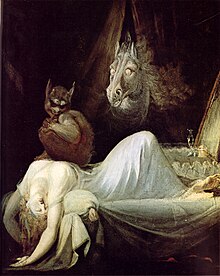The Theory of Psychoanalysis
The Theory of Psychoanalysis is a book by Swiss psychoanalyst Carl Gustav Jung, based on his series of lectures presented at Fordham University.

The Theory of Psychoanalysis (1915)
edit- When people try always to adapt themselves to the conditions of life, the libido is employed rightly and adequately. When this is not the case, the libido is stored up and produces regressive symptoms.
- p. 219
- A phantasy only "really" exists in the unconscious, when it has some notable effect upon the conscious, e. g., in the form of a dream ; otherwise, we may say with a clear conscience that it is not real.
- p. 265
- They are therefore constantly at pains to fish up phantasies of early childhood, vainly hoping to find thus the solution of the neurotic difficulties. They do not see that the solution lies in action, and in the fulfillment of certain necessary duties of life. It will be objected that the neurosis is entirely due to the incapacity of the patient to carry out these very demands of life, and that therapy by the analysis of the unconscious ought to enable him to do so, or at least, give him means to do so.
- p. 281
- The transference does not arise solely in the intellectual sphere, but the libido bound up with the phantasy is transferred, together with the phantasy itself, to the personality of the physician, so that the physician replaces the parents to a certain extent. All the apparently sexual phantasies which have been connected with the parents are now connected with the physician, and the less this is realized by the patient, the more he will be unconsciously bound to his physician.
- p. 285
- It is not that a secret actually cuts off a person from communicating with his fellows, yet somehow personal secrets which are zealously guarded do have this effect.
- p. 289
- Modern humanity demands moral autonomy.
- p. 293
- I must oppose myself energetically to the view that we always mean by this relationship outside the family, a sexual relation in its popular sense. This is the misunderstanding fallen into by so many neurotic people, who believe that a right attitude toward reality is only to be found by way of concrete sexuality.
- p. 299
- ... The unconscious suggested this example, which cannot be accidental, but must be in some way significant for the present situation. In interpreting dreams we have to pay attention to such apparent accidents, since in psychology we find no blind chances, much as we are inclined to think these things accidental.
- p. 349
External links
edit- Jung, C.G. (1915). The Theory of Psychoanalysis. Nervous and mental disease monograph series. Journal of nervous and mental disease publishing Company. Retrieved on 2020-08-21.